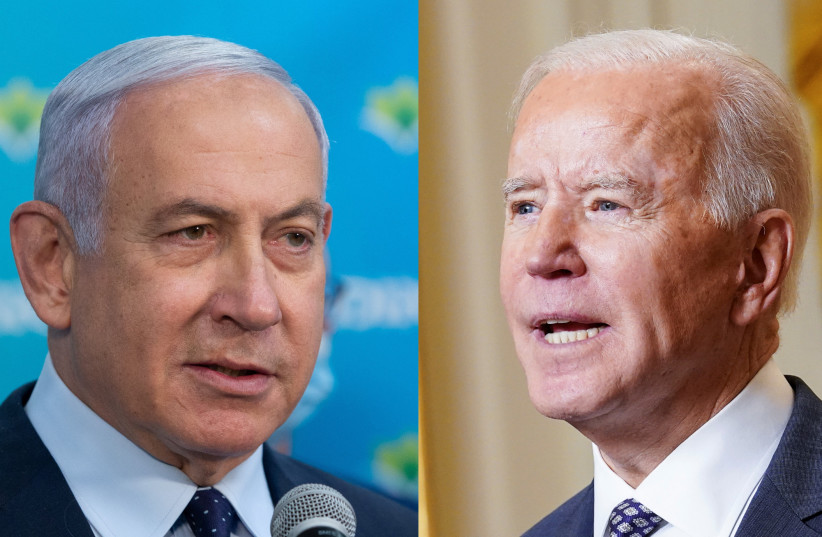Biden extends invitation to Netanyahu: Restoring normalcy to US-Israel relations – editorial
At long last, US President Joe Biden has invited Prime Minister Benjamin Netanyahu for a meeting in the United States.
Speculation can finally end about why Biden snubbed Netanyahu and the long-term implications for US-Israel relations. Anti-Netanyahu forces can stop using the snub as proof that Netanyahu is destroying US-Israel ties, and pro-Netanyahu forces can stop using it as evidence that Biden is succumbing to anti-Israel voices within the Progressive wing of the Democratic Party.
The US president will finally have a face-to-face meeting with the Israeli prime minister, something routine and badly needed to restore normalcy to this critical relationship.
The lack of a meeting conveyed a sense that things were not normal between Washington and Jerusalem, which is bad for both Israel and the US.
The lack of a would have put the US-Israel alliance into question
It is bad for Israel because the world needs to see that the US has the Jewish state’s back, and it is bad for the US because the world needs to see that the White House does not treat the elected leaders of longtime allies worse than autocrats.
 Prime Minister Benjamin Netanyahu and US President Joe Biden (credit: REUTERS/KEVIN LAMARQUE AND ALEX KOLOMOISKY/POOL)
Prime Minister Benjamin Netanyahu and US President Joe Biden (credit: REUTERS/KEVIN LAMARQUE AND ALEX KOLOMOISKY/POOL)Just two weeks ago, for instance, Biden met with Turkish President Recep Tayyip Erdogan. In May, he warmly welcomed Jordan’s King Abdullah II to the White House. But he couldn’t meet Netanyahu?
One could argue that the dual invitations extended to President Isaac Herzog, to meet Biden in the White House and to address a joint meeting of Congress, are ample proof that the US is not giving Israel the cold shoulder.
But had Biden not extended the invitation to Netanyahu, much of the focus of Herzog’s visit would have been on how the Israeli president is welcome in Washington, while the prime minister is not. The purpose of Herzog’s visit – celebrating US-Israel ties and the Jewish state’s 75th year – would have been overshadowed, turning into a way to highlight the differences between the Biden administration and the Netanyahu government.
The positive effect of a White House invitation
Now that an invitation to Netanyahu has been extended, the Herzog visit can be viewed in the manner intended when then-House Speaker Nancy Pelosi and Senate Majority Leader Chuck Schumer invited Herzog last October: as a reaffirmation of the US-Israel relationship.
It is not every day that foreign heads of state address a joint session of Congress, nor is such a high-profile manifestation of friendship commonly on display. It would have been a shame and a missed opportunity had Herzog’s address to Congress been overshadowed by murmurs about why Netanyahu had not been invited.
As was evident in the phone call between Netanyahu and Biden on Monday, during which the invitation was extended, the two leaders have much to discuss, from Iran and the Palestinian Authority to relations with Saudi Arabia and judicial reform.
Biden’s decision to invite Netanyahu likely stems from the realization that continuing to keep Netanyahu at arm’s length causes more harm than good.
Some Israelis and high-profile members of the US Jewish community who oppose the proposed judicial overhaul would have liked to see Biden continue to “punish” Netanyahu to influence him to change course. But the specter of the US president snubbing the Israeli prime minister sets a bad precedent and is a particularly bad look when there are enemies of the relationship seeking to drive a wedge between the two countries.
Working directly with Netanyahu will yield more benefits than ignoring him
If Biden has reservations about Netanyahu and his government’s policies, he should express those objections directly. That’s how partners in a “special relationship” deal with one another – they engage rather than snub each other.
It is no coincidence that the prime minister informed the president during their conversation on Monday that while he intends to pass legislation regarding the reasonableness clause next week, he will use the Knesset recess to seek a consensus with the opposition.
Part of Biden’s decision to reach out to Netanyahu was likely based on the understanding that working with the prime minister would yield better results than ignoring him.
After all, Netanyahu is the prime minister, and despite all the noise and the protests, it does not appear as though he or his government are going anywhere anytime soon. If Biden truly wants to influence Israeli policy, Netanyahu is the man he needs to deal with.





Comments are closed.